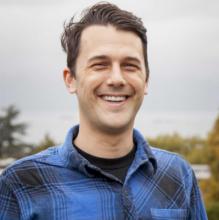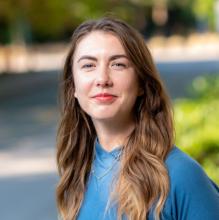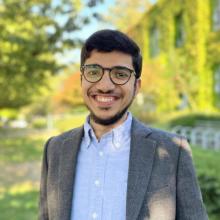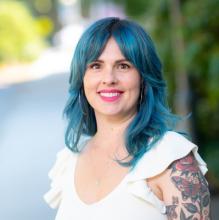“Nothing about us without us is for us” is a powerful phrase that embodies the core principle of research, and I believe it is applicable to any discipline. As a part of my PSI project, I hope to bring together HIV community organizations, BCC3 study participants, and researchers to engage in meaningful dialogue about healthy aging and facilitate the translation of our research findings into action on multiple levels.
Research Description
The study of healthy aging is of great interest, including among people living with HIV. Even though the lifespan has increased because of successful antiretroviral therapy, the healthspan - the number of years spent in good health, remains a concern for this population. Previous research has shown that women living with HIV, who constitute 23% of all people living with HIV in Canada and 50% of people living with HIV worldwide, have more comorbid diagnoses at younger ages compared to HIV-negative women, which may increase their all-cause mortality risk and suggest accelerated/accentuated aging. Women living with HIV are also disproportionately affected by socio-structural stressors that shape healthy aging (financial insecurity, experience of stigma, violence, mental health challenges, and more). This complex interplay of biological, clinical, and socio-behavioral factors affects the health of women living and aging with HIV, and thus warrants further investigation. As a part of the British Columbia CARMA-CHIWOS Collaboration (BCC3 https://hivhearme.ca/) study – a community-based prospective cohort that takes a holistic approach to better understand healthy aging, my overall dissertation research objective is to explore the relationship(s) between markers of immune aging and inflammation, chronic/latent viral infections, chronic pain, and prevalence and risk of age-related comorbidities in the BCC3 cohort. The ultimate goal of my work is to identify the factors that might be driving the accelerated aging experienced by women living with HIV and communicate the findings to both healthcare professionals and women living with HIV themselves. For my PSI project, I plan to “complete the circle” and bring the actionable findings from the BCC3 study back to the participants during Knowledge Translation and Exchange (KTE) events, with an overarching goal to empower women to take charge of their healthy aging journey and equip them with tools and knowledge to support it. The KTE events will be organized with external collaborators within the BCC3 Community Advisory board and will bring BCC3 study participants, doctors, and other stakeholders together to discuss actionable ways to improve women’s health and aging. During the events, BCC3 participants will receive an easy-to-understand personalized booklet that will include actionable study findings, as well as guidance towards the data interpretation and suggested ways to act on the results whether in personal life, in interactions with healthcare providers, or other to improve their healthy aging journey. Overall, I hope to give back to our study participants in a personalized way that will acknowledge the value of their contribution to research, and provide tools and information that will support women in their healthcare and everyday life.
What does being a Public Scholar mean to you?
Being a Public Scholar for me means, first of all, a shift in my mindset. While community engagement has always been a part of my grad school path, I am grateful for the opportunity to prioritize and emphasize this aspect of my work. It is easy to get lost in the endless sea of tasks and ideas of all sizes and shapes while in grad school, and the ability to filter through those and focus on what matters is one of the primary challenges. Lately, I am learning to think about each day as an empty bag that I can fill with various goals and tasks. If we visualize tasks as stones, it would be quite easy to put some large rocks in the bag first, then fill the gaps between them with tiny pebbles. The same isn’t true for the scenario when the bag is filled with the gravel first and there is no more space for boulders. Putting large rocks first in my everyday bag will help me be more consistent and grounded in my exploration of research and life, and I believe that the Public Scholarship Initiative will help ensure that community work is always there in my bag.
In what ways do you think the PhD experience can be re-imagined with the Public Scholars Initiative?
I believe that everyone who chooses to pursue a graduate degree is extraordinary and unique. Yet, it’s very easy to forget this the moment the impostor syndrome kicks in (which is often right away). As a system, graduate school has a lot to offer beyond the opportunity to become an expert in the field of interest. But unfortunately, graduate programs often tend to function in silos, which results in limited exposure to the great thinkers outside of one’s immediate academic environment. In my opinion, the Public Scholars Initiative aims to build not one, but two bridges. One between ideas generated at UBC and the public, and another – between all the bright minds across the graduate programs at UBC. Both bridges are important because the best ideas are born in stimulating conversations which, additionally, help put work into perspective. Ultimately, all research has communities at the receiving end, and all researchers should keep the communities they serve in mind. The Public Scholars Initiative re-imagines the PhD experience by putting the paradigm of public service at the center of a classic academic journey. Just like all the systems, graduate school has potential for improvement and change, and I believe that the values and framework offered by the PSI are a meaningful example of such potential.
How do you envision connecting your PhD work with broader career possibilities?
Our brains usually function based on pattern recognition, no matter the context. Thus, all ideas, even new ones, are made of familiar puzzle pieces, which we collect during everyday exposure to new people, concepts, and challenges. Therefore, my current vision of career possibilities in the future is limited to and informed by my past experiences. I expect this repertoire of choices to expand dramatically after the PSI. My project will explore the ways to close the gap between laboratory-based/clinical HIV research and the community we aim to serve. I am sure that all the community work experience I’ll gain during the next year, as well as the opportunity to learn from other PSI scholars, will help me discover even more opportunities to integrate my skills and interests in a purposeful way.
How does your research engage with the larger community and social partners?
“Nothing about us without us is for us” is a powerful phrase that embodies the core principle of research, and I believe it is applicable to any discipline. As a part of my PSI project, I hope to bring together HIV community organizations, BCC3 study participants, and researchers to engage in meaningful dialogue about healthy aging and facilitate the translation of our research findings into action on multiple levels.
Why did you decide to pursue a graduate degree?
I have always liked studying and learning, so an opportunity to bring my curiosity to a new, more challenging but also more rewarding level, felt like a compelling next step in my journey.
Why did you choose to come to British Columbia and study at UBC?
UBC is uniquely positioned to offer incoming students not only world-class education opportunities but also, quite possibly, the best views in the world. This rare chance to experience high-quality academic and lifestyle environments made it easy to choose UBC.




